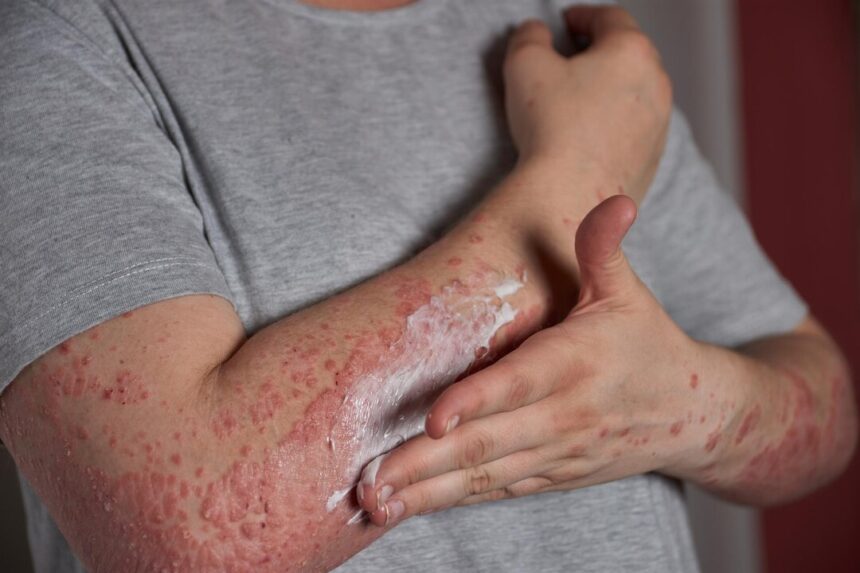Psoriasis is a chronic autoimmune condition characterized by inflamed, scaly patches of skin. While there is no cure for psoriasis, there are various strategies individuals can employ to effectively manage symptoms and improve quality of life. From lifestyle changes to medical treatments, here are ten ways to manage psoriasis:
- Keep Skin Moisturized: Moisturizing regularly helps soothe dry skin and alleviate itching associated with psoriasis. Choose fragrance-free moisturizers and apply them generously after bathing or showering to lock in moisture.
- Avoid Triggers: Identify and avoid triggers that exacerbate psoriasis symptoms. Common triggers include stress, certain medications, infections, alcohol consumption, smoking, and cold weather. By minimizing exposure to triggers, individuals can reduce the frequency and severity of flare-ups.
- Maintain a Healthy Diet: While there’s no specific diet proven to cure psoriasis, adopting a balanced and nutritious diet can support overall health and potentially reduce inflammation. Incorporate plenty of fruits, vegetables, whole grains, lean proteins, and healthy fats into your meals.
- Manage Stress: Stress is known to worsen psoriasis symptoms. Practice stress-reduction techniques such as deep breathing, meditation, yoga, or tai chi to promote relaxation and improve mental well-being. Finding healthy outlets for stress, such as hobbies or exercise, can also be beneficial.
- Limit Alcohol Consumption: Alcohol consumption has been linked to increased inflammation and can trigger psoriasis flare-ups in some individuals. Limiting or avoiding alcohol altogether may help reduce the severity and frequency of symptoms.
- Quit Smoking: Smoking has been associated with an increased risk of developing psoriasis and exacerbating existing symptoms. Quitting smoking can improve overall health and may lead to a reduction in psoriasis severity.
- Use Topical Treatments: Topical treatments, such as corticosteroids, retinoids, coal tar, and salicylic acid, can help reduce inflammation, itching, and scaling associated with psoriasis. Follow your healthcare provider’s recommendations for applying these treatments to affected areas of the skin.
- Phototherapy: Phototherapy, or light therapy, involves exposing the skin to ultraviolet light under medical supervision. This treatment can help slow the growth of skin cells and reduce inflammation associated with psoriasis. Phototherapy may be used alone or in combination with other treatments.
- Stay Hydrated: Drinking plenty of water helps keep the skin hydrated from the inside out. Aim to drink at least eight glasses of water per day to maintain optimal hydration levels and support overall skin health.
- Follow Medical Advice: Work closely with your healthcare provider to develop an individualized treatment plan tailored to your specific needs and preferences. Attend regular check-ups, follow prescribed treatments, and communicate any changes or concerns regarding your psoriasis symptoms.
Managing psoriasis requires a multifaceted approach that addresses both physical and emotional aspects of the condition. By incorporating lifestyle changes, adhering to treatment regimens, and seeking support from healthcare providers, individuals with psoriasis can effectively manage their symptoms and enjoy an improved quality of life. Remember, it’s essential to be patient and persistent in finding the combination of strategies that works best for you.










